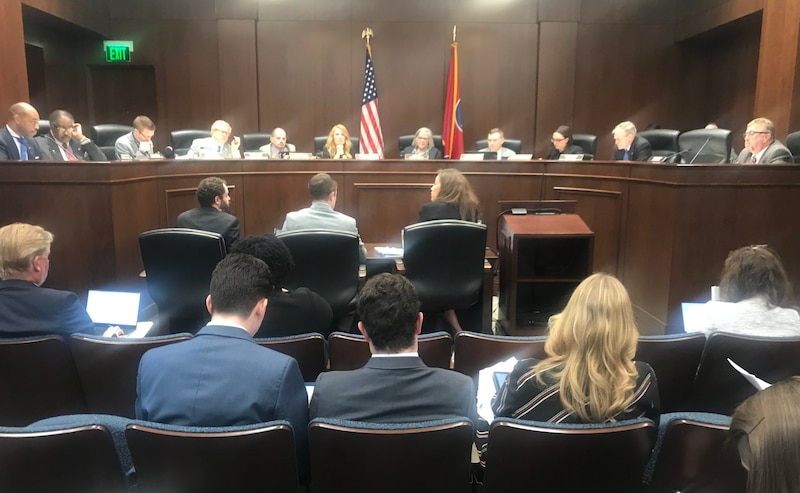Gov. Bill Lee’s comprehensive proposal to revamp how Tennessee students learn to read is advancing in the Legislature after weeks of discussions and revisions.
Gone is the phrase “science of reading,” which has been replaced with the words “foundational literacy skills.” Both refer to phonics-based instruction that starts with sound and builds comprehension by emphasizing content over skills. The wording might make a difference, however, when it comes to hiring a vendor for the initiative’s rollout.
A House education subcommittee approved the latest rewrite on Tuesday, sending the matter to the full panel for consideration next week.
Concerned that just over a third of Tennessee’s third-graders are reading at or above grade level, the Republican governor has set aside $68 million in next year’s proposed budget to overhaul reading instruction. If approved, most of the money would go toward retraining current teachers on the foundational principles of literacy and changing how the state’s teacher training programs instructs the next generation of educators to teach reading.
Groups representing superintendents, teachers, and institutions of higher education have weighed in since the bill’s Feb. 3 introduction, as has the research and advocacy group SCORE, which stands for the State Collaborative on Reforming Education.
“We feel that this bill is a much better product through the collaboration that we’ve had with many members and many stakeholder groups,” said Charlie Bufalino, the education department’s legislative and policy liaison. “We’re very grateful for that process of collaboration.”
One new provision guarantees that the education department will use a competitive bidding process to choose all vendors associated with the rollout. The department and its commissioner, Penny Schwinn, have been criticized in recent weeks for a $2.5 million no-bid contract involving the state’s new education voucher program.
Another change seeks to assure stakeholders that this initiative has nothing to do with the politically sensitive Common Core academic standards, which Tennessee revised and replaced in 2017.
The initial proposal directed that literacy instruction would be based on the “science of reading,” but that language prompted concerns that vendors branding themselves that way would have an advantage over other vendors with the same approach.
Lee’s amended plan now centers on equipping the state’s youngest children with “foundational literacy skills,” defined as “systematic phonics instruction, with a focus on phonemic awareness, phonics, vocabulary development, fluency, and oral language,” combined with “knowledge-based reading comprehension.” Most district leaders support this shift, which many school systems have already begun.

Higher education institutions also would be part of the overhaul, since most Tennessee teachers are trained in colleges of education.
Currently, the state has 44 teacher training programs, but no common requirements when it comes to literacy instruction. That’s going to stop, said Mike Krause, executive director of the Tennessee Higher Education Commission.
“This is an emergent crisis, and we need to make sure we have that standardization so that, whether you’re a school superintendent in Memphis or Johnson City, the education prep candidates you’re getting have a common understanding,” he told Chalkbeat this week.
Krause wants instructors of future teachers to go through the same professional development as existing teachers, as well as pass a reading instruction test developed or identified by the state. “This is all hands on deck,” Krause said, noting that university presidents — not just deans of the various colleges of education — are part of the dialogue.
Several significant sticking points remain with the bill, though.
All districts would have to adopt a common diagnostic tool to assess reading development three times a year in the early grades. But the state already mandates that students in those grades undergo multi-year screenings as part of an existing intervention program launched in 2014 to keep struggling students from falling through the cracks. Districts contract with their own vendors to provide those screenings, and there’s concern that yet another diagnostic test focused on reading could overlap logistically and unnecessarily.
“We just entered into an agreement with Illuminate. So if they do something opposite, now we’ve got two financial implications due to the state coming up with a new bill at the 29th hour,” said Antonio Burt, chief academic officer for Shelby County Schools.
A provision that would exempt high-performing districts from some of the initiative’s requirements is another concern.
“Exempting some [local education agencies] from any part of a reading bill creates inequity for those students, and privileges districts with higher socio-economic populations,” said JC Bowman, executive director of Professional Educators of Tennessee.
House Education Committee Chairman Mark White has welcomed a thorough vetting of the proposal, and expects more scrutiny to come since the final bill “is going to change the way we train students in Tennessee to read,” considered the foundation for all learning.
The Senate has yet to take up the legislation, which that chamber’s education committee could consider as soon as Wednesday. There also are murmurs that individual lawmakers could bring forth alternative proposals.
You can follow the bill’s progression here and read the amended bill below.

